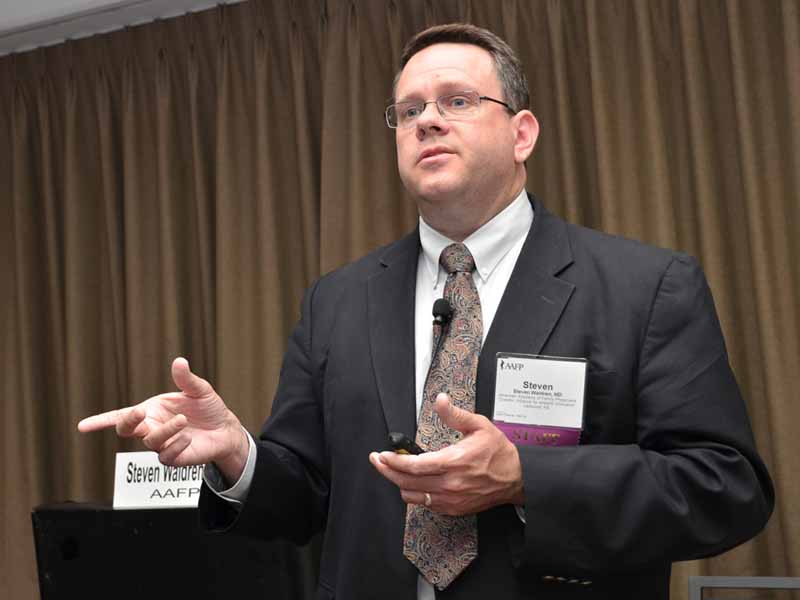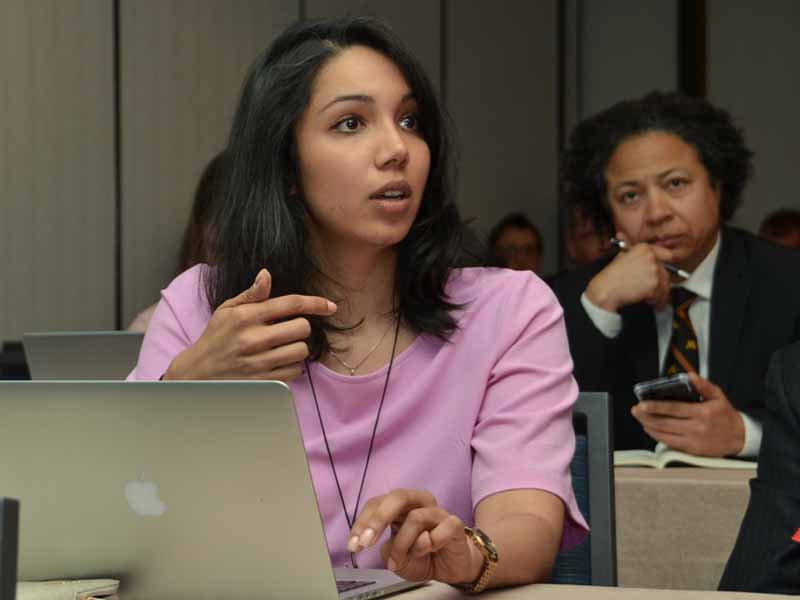Artificial Intelligence, Machine Learning Poised to Help FPs
May 03, 2019 01:27 pm Sheri Porter Kansas City, Mo. – Artificial intelligence and machine learning sound like topics that would appeal more to techie types than family physicians, but one glance around a packed meeting room at the AAFP's Annual Chapter Leader Forum quickly dispelled that notion.

Steven Waldren, M.D., M.S., AAFP VP and chief medical informatics officer, tells physicians attending his breakout session at the 2019 Annual Chapter Leader Forum that artificial intelligence "starts out really dumb, but it is able to learn at an exponential rate."
The breakout session, titled "AI/Machine Learning and the Future of the EHR" and held here on April 26, was hosted by AAFP VP and Chief Medical Informatics Officer Steven Waldren, M.D., M.S. And the family physicians who filled those chairs were engaged from the get-go.
Waldren defined machine learning as the process that occurs when a computer is programmed to learn a task -- not to be confused with completing that task. And, he continued, artificial intelligence exists when a computer can complete a task that typically requires human-level intelligence.
Waldren assured his audience that AI is being created to augment physicians' work, not to replace physicians.
"And so, if you're worried about someone placing an artificial doc in the exam room, that's not going to happen for decades, if ever," he said. Rather, AI offers a real opportunity for family physicians to expand their scope of practice.
Waldren provided an example of what the future could hold.
"What if you had a piece of AI that would help you make sure that you had the accurate staging and diagnosis for cancer? The AI would look at all the evidence and say, 'Here is the most appropriate treatment algorithm for this particular patient.'
"Would you need an oncologist to be able to manage that, or could a family doc manage that? We hypothesize that a family physician could handle that patient," said Waldren.
Story Highlights
Specifically, AI is poised to assist family physicians in the critical areas of
- reducing administrative burden,
- lessening cognitive burden,
- expanding capacity,
- expanding capabilities, and
- predicting disease and outcomes.
"Cool things are happening in the cognitive burden area. For instance, you don't have to look through a 273-page discharge summary to find the couple of clinical pieces you need; AI can do that auto summarization for you," said Waldren.
And AI can also eliminate burdensome and annoying EHR tasks such as inputting data and checking seemingly endless boxes. For example, in the cancer diagnosis example above, "AI would read the CT scan report, look at the CT scan and know how to do that cancer staging," said Waldren.
He explained how use of AI can expand a physician's capacity and capability and described a
Nashville physician who is testing a product that utilizes smart dictation in the patient note.
Before the pilot, this particular physician was spending 10 minutes in each patient's chart, but when he started using the digital clinical assistant "Suki" for smart dictation, he reduced that time to 2 minutes, 48 seconds.
"And then he actually went up to about 3.5 minutes per chart because he found out that he had some time to do all those preventive tasks that are set off to the side," said Waldren.
Regarding the prospect of family physicians using AI to predict disease and outcomes and having the ability to access good evidence without having to read the latest meta-analysis, Waldren walked his audience through that scenario.
"AI would tell me, 'Here is the evidence for this particular type of patient in this subpopulation, this is the frontline drug for this problem.' I would agree, click a button and it's ordered, with appropriate dosing for the patient."

During an educational session on artificial intelligence, Lalita Abhyankar, M.D., M.H.S., of Brooklyn, N.Y., tells her family physician colleagues that part of the problem with EHRs is they were not developed with the end user in mind. "So, if you are able to get involved in this (AI) project sooner, your voice will actually make a difference," she said.
Waldren noted that much of the AI technology being discussed already exists but needs to be trained appropriately. "There are companies working to do that -- and we'll be working with some of those companies in our new innovation lab," said Waldren, referring to a challenge program that was approved and funded by the AAFP Board of Directors in October 2018.
"What we're trying to do is find ways to promote development that we think is needed for family docs and prove that the solutions are effective and adoptable," he explained. And it's critical that developers have input from family physicians in practice as they are building these products, he added.
Even before Waldren completed his presentation, attendees were eager to ask questions. Here's a sampling of those queries and Waldren's responses:
Q: How do we get involved?
A: Call the AAFP, and say you want to be involved. Or, consider creating a member interest group (MIG) on AI and machine learning.
Q: Do you see AI being affordable for small practices?
A: Keeping these things affordable as we move forward is going to be really important for the AAFP to work on, but we're not the ones out there setting prices.
Q: Will this help recruit more students to family medicine?
A: AI will decrease the burden on docs and make practice more enjoyable. That aspect could have an impact on driving students into family medicine. And I can say family medicine is leading the charge on AI, so there is the opportunity for students to be a part of that.
Q: How do you keep the digital assistant, Suki, from recording patient and physician interaction?
A: AI needs to be trained in what you want it to do. The physician could say, "Suki, stop paying attention."
And then there was the family physician from Montana who said that there were way too many folks in his state who think the government is out to get them and are certain someone is always listening in. He asked Waldren how he would handle using a digital assistant in the exam room with a paranoid patient.
"You could say to the patient, 'I'll revert back to hunting and pecking around the EHR and checking boxes and typing my note and spending 15 minutes doing that.' Or you could try to convince the patient the device is not listening," said Waldren.
"We want to make sure the physician has choices on how to handle that situation," he added.
Related AAFP News Coverage
AAFP Joins CMS to Launch Artificial Intelligence Challenge
Goal Is Better Health IT, Improved Patient Outcomes
(3/29/2019)
AAFP's Innovation Fellow Studies Tech, Digital Scribes
Deadline for 2019 Applications Is May 17
(3/20/2019)